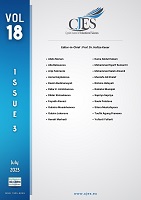Cross-cultural qualitative study of students’ awareness of natural disasters in Saudi Arabia, Yemen, and Egypt
Cross-cultural qualitative study of students’ awareness of natural disasters in Saudi Arabia, Yemen, and Egypt
Author(s): Fayadh Hamed Alanazi, Mustafa Ali Khalaf, Mohammed Saleh Alzamil, Abdo Noman M. AlmuftiSubject(s): Vocational Education, Higher Education , Policy, planning, forecast and speculation, Demography and human biology, Environmental interactions, Sociology of Education
Published by: Birlesik Dunya Yenilik Arastirma ve Yayincilik Merkezi
Keywords: cross-cultural study; earthquakes; natural disasters; science education; volcanoes;
Summary/Abstract: In recent years, there has been a remarkable increase in the intensity and frequency of natural disasters. There is no doubt that a thorough knowledge of natural disasters and an adequate awareness of how to protect against their negative consequences will spare many individuals considerable losses. Accordingly, the present study aims to investigate students’ level of awareness of natural disasters within a cross-cultural perspective. Twelve schools in Saudi Arabia, Egypt and Yemen were selected (four schools from each country). The total research sample consisted of 180 sixth and ninth grade students randomly selected from the targeted schools, with 60 students from each country. Semi-structured interviews were implemented. The results indicated that most students in the three countries have a false or incomplete perception of earthquakes and volcanoes. Only 20.6% of students had a correct perception of how earthquakes occur. An analysis of students’ drawings of earthquakes and volcanoes revealed that, on average, only 13.3% were able to clarify the scientific reason for earthquakes; the highest percentage of correct answers came from Egyptian students (15.0%), followed by Saudi students (13.3%) and then Yemeni students (11.7%). Religious understanding, culture, and day-to-day experiences of the learners turned out to influence their cognizance and analysis of natural events. It was concluded that students develop intricate understanding and theories based on their beliefs and experiences.
Journal: Kıbrıslı Eğitim Bilimleri Dergisi
- Issue Year: 18/2023
- Issue No: 03
- Page Range: 588-604
- Page Count: 17
- Language: English

